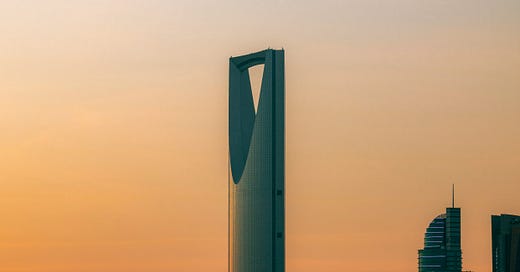Gulf venture capitalists keep a close watch as Trump tariffs bite
If oil prices stay where they are today, things could look very different
No one has been immune to Trump’s tariff tantrums. In the Gulf, where sovereign wealth remains the support pillar for its incredibly young startup ecosystem, venture capitalists are keeping a close watch over the latest turn of events.
Startups in the Middle East and Africa are already raising less as cautious investors hold back on capital deployments. According to Magnitt, Middle East and African startups raised $1.5 billion and $1.1 billion respectively in 2024 — a 29% and 44% corresponding drop from the previous year.
The market volatility has already taken the wind out of US IPOs with Klarna, StubHub and eToro Group all putting their listing plans on hold.
This is likely to play out in the Gulf as well, except that in the Middle East, many investors have been eagerly waiting for this IPO window to open only to realise that they may have to wait a little bit longer.
“The question that keeps coming up in this region is – where are the exits? Where are the exits? We're finally at a position where we have a lot of companies coming up and marching towards IPO and are exitable,” shared Sonia Gokhale, general partner, VentureSouq at UNConference 2025 last week.
“If the Trump (tariffs) were not happening, we’d be like, great, we’re finally at a place where we’re getting IPOs…(But I think that) some of these exits which people have been waiting for might just get delayed,” she added.
The Gulf’s venture capital (VC) industry is among the youngest globally and remains highly financed by sovereign oil wealth. Saudi Arabia’s push into VC, tech and startups only began as recently as 2016-18 after the Crown Prince Mohammed bin Salman ascended to de facto ruler of the Kingdom.
However, his ambitious Vision 2030 plans, which include multi-billion dollar giga-projects like NEOM and The Line, have reportedly been scaled back due to a variety of reasons including rising costs.
Last month, Saudi’s Public Investment Fund (PIF) imposed a one year ban on any new advisory work going to PwC, signaling tighter scrutiny over the management of its projects.
If oil prices continue to slide lower than $60 a barrel as they have during Trump’s tariff tirade, the question is whether VC and startups across the Middle East will continue to enjoy the same continued generosity in sovereign support.
“(The sovereigns) are able to spend, but at the same time it’s not conducive on a global stage. They’re the only ones that are actually pumping money into the ecosystem. So the government needs to be a lot more selective today. I’m not saying that there’s no money, I’m not saying there’s tons of money, but it is very, very, very selective,” said Walid Faza, partner, Novo Capital at Fluidity 2025 in Dubai.
In many ways, the GCC is still remarkably insulated from most of the market shocks happening to VC and tech everywhere else globally.
Saudi Arabia and the UAE in particular, enjoys relatively higher GDP per capita compared to other emerging markets. Both currencies are also pegged to the greenback, which means foreign investors can still participate in emerging market growth without too much exposure to currency risk.
Startup valuations are still high compared to other emerging markets, note investors. But with tech talent still moving into the Gulf, this could still be a good time for builders to build and for early-stage investors to invest.
For now at least, it’s watch-and-see mode until the market jitters shake out. Fund managers still have plenty of dry powder left to deploy, so that will likely keep MENA’s startup ecosystem supported in the near term.
But if the global economy takes a sharp turn, scenarios can change quickly.
“I do feel like if we actually enter into recession it would be a very different story,” said Courtney Powell, chief operating officer, 500 Global.
“The Saudi market has been largely sheltered from major macro swings over the past few years so I don’t expect that to change...But where I could see things affect this region is oil prices. If oil prices stay where they are today, then I think all bets are off. Six months from now, things could look very, very different,” she cautioned.






